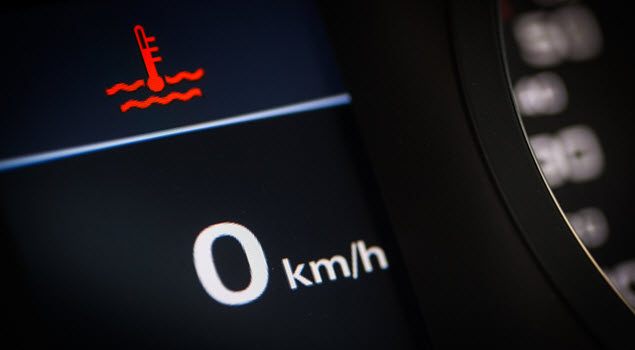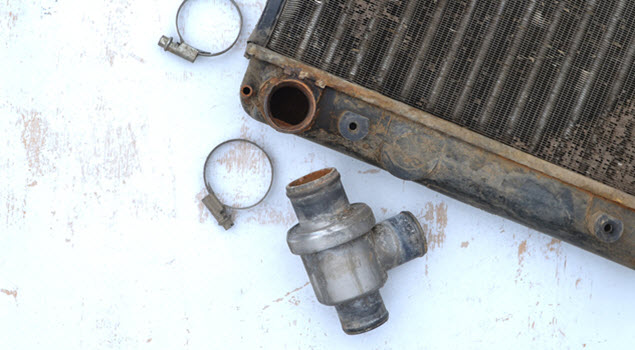Your Volkswagen’s radiator is part of its cooling system and prevents your engine from overheating. As your engine operates, it generates an immense amount of heat, and the radiator acts as a heat exchanger, dissipating this excess heat and maintaining an optimal temperature for the engine to function efficiently. This heat exchange is achieved with the help of a network of fins and tubes in the radiator that allows coolant to flow through.
The circulating coolant in the radiator tubes releases heat into the air. This continuous process keeps your engine operating within a temperature range that ensures optimal performance and longevity. When the radiator becomes rusty, it jeopardizes this crucial cooling process, potentially leading to diminished engine performance and increased risk of overheating. Knowing how to address a rusty radiator is paramount for preserving your VW’s engine health and ensuring efficient cooling system operation.
Radiators are meticulously designed components meant to withstand various conditions yet can still succumb to rust due to several factors as discussed below.
Water Quality
Poor-quality or untreated water in the cooling system can contribute to rust formation. Minerals and impurities in the water react with the metal components of the radiator, leading to corrosion.
Lack of Coolant Maintenance
The coolant in your VW serves not only to regulate the engine temperature but also to prevent corrosion and rust within the cooling system. Neglecting regular coolant changes and maintenance can allow the coolant to lose its corrosion-inhibiting properties. Without proper protection, the radiator becomes more susceptible to rust.
Environmental Factors
Environmental factors have a role in the corrosion of radiators. In areas with harsh winters, road salt is often used to melt ice and snow on roadways. As you drive, your vehicle’s undercarriage, including the radiator, can come into contact with salt and other contaminants. These environmental elements can speed up the rusting process, especially if not addressed through regular maintenance.
How to Identify a Rusty Radiator in Your VW
- Discolored Coolant: If you notice that the coolant in your radiator has a rusty or muddy appearance, it’s a clear sign of rust contamination. Healthy coolant should be a vibrant color, so any discoloration is a cause for concern.
- Overheating Engine: As mentioned, a rusty radiator may not efficiently dissipate heat, leading to engine overheating. If your vehicle consistently experiences high temperatures, it could be indicative of rust hindering the radiator’s cooling capabilities.
- Leaking Coolant: Rust can cause corrosion in the radiator, leading to leaks. Check for puddles of coolant beneath your vehicle or signs of dried coolant around the radiator area.
- Reduced Cooling Efficiency: If you observe a decline in your vehicle’s overall cooling efficiency, such as the temperature gauge consistently running higher than normal, it could be a sign that rust is impeding the radiator’s ability to regulate engine temperature.
Inspect for Visible Rust
Regular visual inspections of your radiator are essential. Look for any signs of visible rust on the surface. If surface rust is detected, take immediate action to prevent its spread. Use a wire brush to remove the surface rust, and apply a rust inhibitor or primer to create a protective barrier and inhibit further corrosion.
Flush the Cooling System
Periodic flushing of the cooling system is vital for maintaining its health. Flushing removes old coolant along with any contaminants that may contribute to rust. Follow the manufacturer’s recommended coolant change interval, and use the specified coolant type for optimal protection against rust.
Professional Inspection
If you’re unsure about the extent of rust in your radiator or if you experience persistent issues like overheating, seeking professional help is advisable. A qualified mechanic can conduct a comprehensive inspection, identify the root cause of the problem, and recommend appropriate solutions for your Volkswagen.
Get Premium Volkswagen Maintenance and Repairs
At Woodinville Sports Cars, we understand the importance of keeping your VW in pristine condition, especially regarding the heart of your vehicle—the radiator. Our team is dedicated to ensuring your Volkswagen radiator is shielded from the perils of rust and corrosion.
From Bothell to Kenmore, Kirkland to Mill Creek, Monroe to Redmond, Snohomish to Woodinville, WA, we’ve been a trusted partner for VW enthusiasts, providing top-notch maintenance and protection services. Don’t leave the health of your radiator to chance. Call us now, and let us be your go-to destination for expert care and maintenance.





Recent Comments